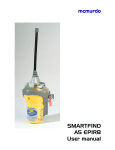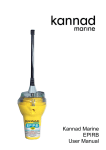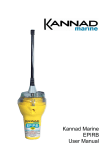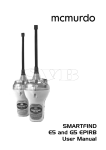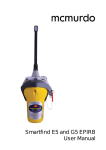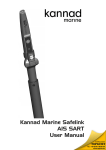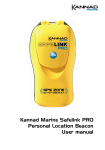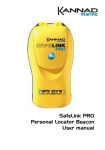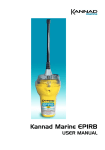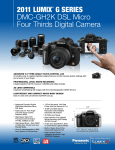Download Sport and Sport+ EPIRB User Manual
Transcript
Sport and Sport+ EPIRB User Manual Safety notices CAUTION: The EPIRB is an Emergency Position Indicating Radio Beacon. Use only in situations of grave and imminent danger to life. CAUTION: False alerts endanger lives and cause disruption to Search and Rescue services. Deliberate misuse of the EPIRB could result in penalty. WARNING: Spring action antenna deployment; tilt the EPIRB away from your face when deploying the antenna. CAUTION: Do not dismantle the EPIRB. Contains no user-serviceable parts. CAUTION: Contains lithium batteries. Do not incinerate, puncture, deform, short-circuit or recharge. CAUTION: Dispose of a used EPIRB in accordance with local waste disposal regulations. Refer to End of Life Statement. CAUTION: Avoid using chemical solvents to clean the EPIRB as some solvents can damage the case material. CAUTION: An EPIRB is a radio transmitter. Some administrations may require that the user holds a valid radio licence to cover its ownership and use. WARNING: the high intensity flashing strobe light may cause discomfort if viewed for prolonged periods. Radio Frequency Exposure Warning WARNING: The EPIRB emits low levels of radio frequency radiation; avoid handling the antenna once activated. Registration The EPIRB must be promptly registered with the appropriate National Authority. Failure to register the EPIRB could delay a Search and Rescue (SAR) response and may be unlawful. Ownership details Vessel Name: Owner details: EPIRB Unique HEX ID; Disclaimer The information and illustrations contained in this publication are to the best of our knowledge correct at the time of going to print. We reserve the right to change specifications, equipment, installation and maintenance instructions without notice as part of our policy of continuous product development and improvement. No part of this publication may be reproduced, stored in a retrieval system or transmitted in any form, electronic or otherwise without permission in writing from Orolia Ltd. No liability can be accepted for any inaccuracies or omissions in the publication, although every care has been taken to make it as complete and accurate as possible. This manual is applicable for Kannad Marine Sport and Sport + version 2 EPIRB manufactured after August 2011. Page 1 IN EMERGENCY Remove the EPIRB completely from its bracket Pull the tear-off tab up, then press the activation button and slide the switch left An EPIRB is an emergency device for use only in situations of grave and imminent danger to life. False alerts endanger lives. Help prevent them by understanding how to look after the EPIRB. Introduction Thank you for purchasing this Class 3 manually activated Emergency Position Indicating Radio Beacon (EPIRB). It is intended for use by non-SOLAS vessels. When carrying an EPIRB you enjoy the reassurance of a last resort safeguard against any life threatening incidents that may occur anywhere in the world. If you find yourself in a remote area without any other form of emergency communication, on sea or land, your EPIRB can call for help. EPIRBs transmit a unique emergency message identifier via the Cospas-Sarsat satellite system which can determine your location anywhere on the earth’s surface. In most cases the first emergency alert is received within 5 minutes of activation, but depending on satellite coverage at the time, this can sometimes extend to 45 minutes. When the emergency alert message is received at a Rescue Co-ordination Centre (RCC) it is cross referenced using the unique identifier (often called Hex ID) against your registration details. Details of the alert are forwarded to the appropriate local Search and Rescue (SAR) teams. Keeping your registration details up to date is critical to ensuring a quick SAR response. If you have purchased the GPS version, it has a built-in GPS receiver which can reduce the time for Search and Rescue teams to arrive on scene, as your precise coordinates are transmitted within the first few minutes. Non-GPS versions are pinpointed using Doppler Shift from the over-flying satellites. The EPIRB has a secondary ‘homing’ transmitter which allows SAR teams to direction- find or ‘home in’ on the EPIRB once they arrive on the scene. The EPIRB has a storage life of 7 years. Once activated the EPIRB will continue to transmit emergency alerts for a minimum of 48 hours. For further information visit Cospas-Sarsat on line at www.cospas-sarsat.org User registration The EPIRB’s unique identifier must be registered with the national authority indicated in the white area of the label on the rear of the EPIRB. Complete the user registration form included with your purchase and return it to the address indicated. Some authorities allow online registration; check the guidance notes printed on the registration form for further information. Refer to Annex 1. for details of specific user registration requirements applicable for Australia and New Zealand. Always ensure that any changes of registration or contact details are promptly notified. Page 2 Overview An EPIRB is intended to be a one-shot device. Once activated it will transmit emergency alerts for at least 48 hours. The EPIRB will work best while floating in water, but can also be operated while on board a vessel, in a liferaft or on land (when placed on the ground). The key components of your EPIRB are: Antenna Flexible whip, should be near vertical when operating. Strobe Light Flashing signal light, visible through the clear lens dome when the EPIRB is switched on. LED Indicates the current operating status, visible through the clear lens dome. Activation switch Protected by a tear-off anti-tamper tab. Break the tab upwards, push the switch in and move it fully left to activate the EPIRB. Test button Self test verifies the readiness of the EPIRB. Lanyard Pull the lanyard spool down to free it. Use the cord to tether the EPIRB to a PFD (Personal Flotation Device) or survival craft. Antenna Test button Strobe light zone Lanyard Page 3 Red LED Green LED (GPS model only) EPIRB activation switch. Break off the anti-tamper tab to gain access to the activation switch beneath. Activation procedure Remove the EPIRB completely from the Carrysafe collar to gain access to the rear facing activation switch. 1 1. Release the antenna tip 2 2. Pull the R-clip out of the bracket and release the retaining strap 3 3. Lift the EPIRB out of the collar Activate the EPIRB (only in an emergency) 1. Break off the anti-tamper tab by pulling it upwards 2. Push the switch catch in and move the switch fully to the left “ON” position The antenna should be positioned as upright as possible with a clear view of the sky. Page 4 When the EPIRB is first switched ON the strobe light will start to flash immediately. The first alert transmission is made after 50 seconds. This short delay allows time to slide the switch back to the OFF position if the EPIRB was activated in error and before the first emergency alert transmission is sent. i While the red LED remains ON continuously, the EPIRB is activated but has not yet made an emergency alert transmission. Strobe light Four high intensity LEDs flash simultaneously to produce the strobe light zone, this provides a visual means of locating the EPIRB. It will start flashing immediately after the EPIRB is switched ON. Its flashing will pause for a short time when each 406 MHz alert transmission is sent, which is once every 50 seconds. Strobe light (EPIRB ON) 1 flash every 3 seconds, pause every 50 seconds Red LED (indicator) The red LED illuminates when the EPIRB is first switched ON and will start to flash slowly once the first transmissions are made. 121.5 MHz transmission is taking place whenever the Red LED is flashing alternately with the high intensity LED. Every 50 seconds, the red LED will flash rapidly followed by a single long flash to indicate each 406 MHz transmission. Green LED (GPS version only) The green LED flashes alternately with the strobe, to indicate that a valid position has been obtained by the GPS receiver. Every 50 seconds it illuminates for 2 seconds to indicate that the position is being transmitted on 406MHz. Every 20 minutes the GPS receiver updates its position information. If a fix is not obtained, the green LED stops flashing, and illuminates only every 50 seconds, when the previous position information is transmitted. Deactivation Should the EPIRB be activated by mistake or if the emergency ends then the EPIRB can be turned OFF by sliding the activation switch fully to the right. The high intensity LED will stop flashing and the red LED will go out. Page 5 Important After EPIRB activation and as soon as practical the EPIRB should be taken to a service agent, who will fit a new switch anti-tamper tab and check the battery condition. If the EPIRB has been used for more than 6 hours in total, a set of fresh battery packs should be fitted to ensure the full 48 hour operational life is still available. Refitting into the bulkhead bracket Hold the bracket collar open and drop the EPIRB in. The EPIRB body has side alignment slots to guide it into the locating lugs on each side of the bracket collar. Hold the collar shut and fit the R-clip to secure the EPIRB. Fold over the antenna and locate the end moulding in the retaining slot. 1 2 Align slot with lug 3 Fit R-clip Page 6 Locate end of antenna in slot Self test Self test button The EPIRB has a built-in self test capability that will confirm whether the battery is healthy, both distress transmitters are functional and that the high intensity strobe light is operational. It is recommended to self test the EPIRB monthly, more frequent self testing can put unnecessary drain on the battery. During the EPIRB self test, a specially coded test transmission is sent that will not alert the authorities. A self test can be made while the EPIRB is still in the Carrysafe bracket. The self test should be carried out during the first 5 minutes of the hour so as to minimise any disturbance of the emergency channels. 1. Push and hold the TEST button down until the red LED indicator lights. 2. A successful self test will result in the red LED and strobe light flashing together a number of times. Operation of the test for the GPS model is identical, except that the green LED flashes in time with the red LED. 3. The number of strobe light flashes indicates past battery usage; Accumulated Battery Use (hours) 0 to 4 4 to 6 More than 6 Number of strobe light flashes 3 2 1 Once the self test has completed the EPIRB will switch off automatically. A self test failure will result in NO strobe light flash and the red LED turning OFF. Important Each self test draws small amounts of energy from the battery pack. Unnecessary testing of the EPIRB will reduce the run time of the EPIRB in an emergency. On average, the EPIRB should only be self tested 12 times per year, or a total of 84 times. If the EPIRB has been activated for a cumulative period in excess of 6 hours (self testing and operation), then the battery must be replaced to ensure that in an emergency it will still operate for a minimum of 48 hours at -20 pC as required by International regulations. If the EPIRB fails self test it should be immediately removed from service. Refer to the maintenance section for further information. Page 7 Long self test (GPS version only) The GPS model can also be put through a GPS long self test which includes allowing the GPS to acquire a fix. As this test consumes significant amounts of power it is restricted to a maximum of 10 tests in total. GPS long self test procedure Take the EPIRB outside under an unobstructed sky. Press and hold the TEST button until the red LED lights, then release. Wait for the standard self test to complete, then immediately the strobe light flashes, press and hold the TEST button for 15 seconds or until the red LED lights again. The red LED will stay ON and the green LED will begin to flash. The TEST button may now be released. Typically the test will run for 15 minutes, during the test do not shield the EPIRB and do not stand over it. A successful GPS position test will cause the green LED to light continuously for a short length of time and then go out. A fail is indicated by a continuous red LED. Choosing the best location Your EPIRB will work best when under an unobstructed view of the sky. If it is not possible to pick a location with a totally unobstructed view of the sky, position the EPIRB to maximise the sky view. Aboard vessel Stand the EPIRB on the deck, choosing a position with the best sky view. Ensure that the wind does not knock the EPIRB over. Never secure the EPIRB lanyard to a vessel in danger of sinking. Liferaft Attach the securing lanyard to the liferaft or your clothing (to avoid loss of the EPIRB if you are thrown out of the liferaft). Activate and deploy the EPIRB into the water and let it float nearby on the end of the lanyard. Operating the EPIRB inside a Liferaft or under a canopy can reduce its performance. Lifejacket Attach the securing lanyard cord between the EPIRB and clothing to avoid loss of the EPIRB. Activate and deploy the EPIRB into the water, allow it to float close by. Avoid holding or blocking the antenna’s view of the sky. On foot If you must walk for help, ensure the antenna remains vertical after activating the EPIRB. Avoid holding or blocking the antenna’s view of the sky. Aircraft An EPIRB is an additional carry-off safety device. As the EPIRB signal may be blocked by aircraft metalwork it is recommended to activate it after landing and away from any shadowing by the aircraft’s metalwork. Vehicles The EPIRB will not work well inside a vehicle due to metalwork shadowing. Exit the vehicle, activate the EPIRB, and place it on the roof, the hood, or on the ground away from the vehicle. Land Find the best sky view, place the EPIRB on the ground with the antenna pointing towards the sky and ensure wind does not knock the EPIRB over. Page 8 Getting the best from your EPIRB Aboard ship: DO: i i Place the EPIRB in the open, clear of overhangs Keep the EPIRB upright (hold it if necessary) DO NOT: i Place the EPIRB close to large structures i Lay the EPIRB on its side i Place the EPIRB under cover i Secure the EPIRB lanyard to the vessel OK YES NO In a liferaft: i Deploy the EPIRB so that it is visible outside the liferaft canopy. Uncoil the lanyard and tie it to the liferaft, then throw the EPIRB overboard so that it floats close by. Page 9 Bulkhead bracket installation When permanently installing the EPIRB to a vessel, the bulkhead bracket should be securely fixed in an easily accessible location near to the main emergency exit. The bulkhead bracket has two parts. The EPIRB can be quickly unclipped from the bulkhead mount for easy stowage while still held in the Carrysafe collar. BEST Press catch and lift the Carrysafe collar Bulkhead bracket installation When selecting a suitable mounting position consider: i Ease of access in an emergency. i Position at least 1 metre from compass equipment and 50 cm from powerful magnets e.g. magnets found in loud speakers and radio equipment. i Allow sufficient clearance above the EPIRB to allow for easy removal from the bulkhead bracket. Page 10 Mounting procedure The bulkhead bracket is designed to mount on a flat surface using four fixing points. Four stainless steel screws 25mm in length are included. Check that the rear side of the mounting surface is clear and that the fixing screws will not penetrate through into any other objects. Offer the bracket into the chosen position and mark through the mounting slots using the bracket as a template. Drill four 3mm (1/8”) holes and securely screw the bracket in place. Stowage options The Carrysafe collar provides additional protection for the EPIRB if you intend to keep it in a carry off “safety ditch bag” or when transporting the EPIRB from place to place. i CAUTION: Do not stow the EPIRB near to magnets, loud speakers or other equipment containing magnets. As they may cause to EPIRB to falsely activate. Page 11 Marking a vessel name In case of loss and to aid in its quick recovery, we recommend marking the EPIRB with your vessel name and/or ownership details. A set of alpha-numeric stick-on letters are provided, these can be stuck on the rear label area. 1. Pick off the required letters (use a scalpel/knife blade or similar warning use with caution) 2. Fix each letter to label area on the rear of the EPIRB. 3. Cover the letter text for protection using the clear label material also provided. Dealing with a transmitting EPIRB In the unlikely event that the EPIRB develops a fault and will not turn off, transmissions can be prevented from reaching the satellite by cutting off the antenna close to its base. The EPIRB should then be wrapped in metal foil or placed in a sealed metal container or steel locker. Take care when handling the antenna, refer to product safety warnings. i Contact the authorities to notify them of the false alert i Leave the EPIRB for 3 days or until the battery has fully run down before having the EPIRB serviced. Page 12 False alerts If the EPIRB has been accidentally activated, or if rescue is affected before arrival of the rescue services: i Switch off the EPIRB and notify the appropriate rescue services or authorities at the earliest possible time. i Contact the rescue services, coastguard, or police by radio or telephone to advise them of the false alert. You may be asked to provide the UIN (15 digit Hex ID number) of the EPIRB, date, time, duration, cause of activation and geographic location at the time you switched off the EPIRB. Routine maintenance Self test the EPIRB monthly, check that the battery is in date and examine the outer case and bracket for any signs of damage. If required, clean the outer case with fresh water, wipe dry and examine the EPIRB and bracket for any damage. CAUTION: Never use chemical solvents to clean the EPIRB or bracket. After activation The anti-tamper switch cover must be replaced by a service agent. (See page 17) CAUTION: The battery may be run down and need replacement (see below). Inadvertent operation The anti tamper switch cover must be replaced by a service agent and the remaining battery life checked (see below). Battery replacement The exact battery expiry date is marked under the EPIRB lens dome. The batteries must be replaced when: i i i The expiry date has been reached or The EPIRB has been used in an emergency situation or A false activation exceeds 6 hours of use. Servicing Service of the EPIRB should only be carried out by an approved service agent. Keep the original packing material for re-use whenever the EPIRB is sent for battery replacement or service. Page 13 Transportation Passenger Aircraft: This product contains small lithium metal batteries. The EPIRB can normally be taken on board a passenger aircraft as a personal item in carry-on hand baggage. We always recommend declaring the EPIRB to airline staff at check-in, in the same way you would for a laptop, PC or video camera. As air cargo: This product contains small lithium metal batteries. Due to the overall low level of lithium content the EPIRB is classed as “not restricted” as air cargo under IATA packing instruction – PI 970. Always check with the carrier concerned for any additional restrictions that could apply. Specifications EPIRB Type Kannad Marine Sport, Sport+ Operation Manual activation Class 3, Non float free 121.5 MHz Homer Operating frequency Power output Modulation Operating frequency Power output Modulation Switch, protected by antitamper seal. Checks transmitters, battery and high intensity LED 406.040 MHz + 1 kHz 5 W typical Phase (16K0GID) 121.5 MHz +3.5 kHz 50 mW radiated typical Swept tone AM (3K20A3X) GPS Receiver (Sport+ version only) High intensity LED Centre frequency 1.57542GHz Type Light output Vertical Type Operating life Storage Replacement Use Operating temperature Storage temperature Waterproof Buoyancy Exterior Finish High intensity LEDs 0.75 cd minimum Whip Lithium metal 48 hours minimum 7 years By service centre Logged by microcontroller -20 pC to +55 pC -30 pC to +70 pC Immersion to 10m Floats High visibility yellow Without GPS 609g With GPS 615g 21 cm 18 cm 39 cm 5.5m, 40Kg breaking strain Removable Carrysafe collar Cospas-Sarsat T.001/T.007 IEC 61097-2, AS/NZS 4280.1 Self test button 406 MHz Transmitter Antenna Battery Environment Physical Fixing Standards applied Weight Height of body Length of antenna Overall Lanyard Two part Bulkhead bracket Satellite system EPIRB Page 14 End of Life Statement When the product has reached the end of its useful life, it is vital that the battery is removed from the main body of the EPIRB to prevent false alerts. False alerts cause expensive disruption to Search and Rescue services and may endanger lives as a consequence. Safe disposal Contains traces of lithium, may contain traces of lead and brominated flame retardants (BFRs), both in the housing material and circuit boards. DO NOT INCINERATE Declaration of Conformity Hereby Orolia Ltd declares that this EPIRB is in compliance with the essential requirements and other relevant provisions of EC Directive 1995/5/ED. The Declaration of conformity can be obtained from www.kannadmarine.com/documents Page 15 Warranty IMPORTANT Orolia Ltd warranty registration Congratulations on purchasing your beacon. As standard your unit has a one year (12 months) warranty from the date of purchase shown or your invoice, however, this can be extended by a further four years by simply registering your unit on-line at: www.kannadmarine.com Then follow the REGISTER WARRANTY link at the top of the page. Warranty Statement Subject to the provisions set out below Orolia Ltd warrants that this product will be free of defects in materials and workmanship for a period of up to five years (see above) from the date of purchase. Orolia Ltd will not be liable to the buyer under the above warranty:for any defect arising from fair wear and tear, wilful damage, negligence, abnormal working conditions, failure to follow Orolia Ltd’s instructions (whether oral or in writing) including a failure to install properly and/or to use batteries recommended and/or supplied by Orolia Ltd, misuse or alterations or repair of the product by persons other than Orolia Ltd or an Approved Service Agent; for parts, materials or equipment not manufactured by Orolia Ltd in respect of which the buyer shall only be entitled to the benefit of any warranty or guarantee given by the manufacturer to Orolia Ltd; for the battery storage life which is specifically excluded from this warranty; if the total price for the product has not been paid. THE LIMITED WARRANTY STATED ABOVE IS EXCLUSIVE AND IN LIEU OF ANY OTHER WARRANTY, EXPRESS OR IMPLIED, INCLUDING BUT NOT LIMITED TO ANY IMPLIED WARRANTY OF MERCHANTABILITY OR FITNESS FOR A PARTICULAR PURPOSE. Orolia Ltd will not be liable for indirect, special, incidental or consequential damages of any kind sustained from any cause. In no event shall Orolia Ltd be liable for any breach of warranty or other claim in an amount exceeding the purchase price of the product. This warranty does not affect any statutory rights of the consumer. In order to be valid, claims must be made under the above warranty in writing as soon as practicable after discovery of the defect or failure and within the warranty period referred to above. Proof of purchase will be required. The claim should be sent together with the product in question to the address set out below or to an Approved Service Agent. Following a valid warranty claim Orolia Ltd shall be entitled to repair or replace the product (or part) in question free of charge, or at Orolia Ltd’s sole discretion to refund to the buyer the price of the product (or a proportional part of the price). Orolia Ltd shall not be liable to a buyer who is not a consumer for any other loss or damage (whether indirect, special or consequential loss of profit or otherwise) costs, expenses or other claims for compensation which arise out of or in connection with this product. In the case of a consumer Orolia Ltd shall only be liable where other loss or damage is foreseeable. Nothing shall limit Orolia Ltd’s liability for death or personal injury caused by its negligence. This warranty is to be interpreted under English law. All enquiries relating to this warranty or Approved Service Agents should be sent to: Orolia Ltd, Silver Point, Airport Service Road, Portsmouth, Hampshire, PO3 5PB, UK Telephone: Int + 44 (0) 23 9262 3900 Fax: Int + 44 (0) 23 9262 3998 Web: www.kannadmarine.com Email: [email protected] An Orolia Group Business Page 16 Annex 1. Registration information Advice of EPIRB Purchase or Transfer. Registration of 406MHz satellite EPIRBs with the EPIRB Registration Section of the national authority is mandatory, due to the global alerting nature of the Cospas-Sarsat system. The information provided in the registration is used only for search and rescue purposes. Fill in the owner registration card immediately upon completion of the sales transaction. Mail, fax or email the registration card to the national authority (refer below) immediately. Registration cards are also available online. If the beacon is to enter service immediately, complete the registration card and fax or email the information to the relevant national authority. If the beacon is being transferred to a new owner, the current owner is to inform the national authority by email, facsimile, letter or telephone of the name and address of the new owner. The new owner of the beacon is required to provide the national authority with the information as shown on the registration card. This obligation transfers to all subsequent owners.’ The authorities will normally provide the registered user with a DECAL label which you are obliged to fit to the EPIRB body as ‘proof of registration’. User registration point of contact; Australian users address all correspondence to: Beacon Registration Section, AusSAR Australian Maritime Safety Authority GPO Box 2181 Canberra City ACT 2601 Fax: International +61 2 9332 6323 Local 1800 406 329 Email: [email protected] On-line registration: www.amsa.gov.au/beacons Phone: +61 2 6279 5766 or 1800 406 406 New Zealand users address all correspondence to: Rescue Co-ordination Centre New Zealand PO Box 30050, Lower Hutt 5040 Fax: +64 4 577 8041 Email: [email protected] Phone: +64 4 577 8033 AFTN: NZWNYCYX Inmarsat-C: 582451200067 Page 17 Orolia Ltd Silver Point Airport Service Road Portsmouth PO3 5PB United Kingdom Phone: Fax: Email: Website: +44 (0)23 9262 3900 +44 (0)23 9262 3998 [email protected] www.kannadmarine.com An Orolia Group Business 82-1073-006 Issue 2




















